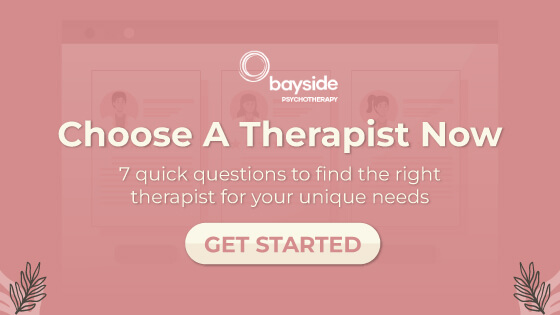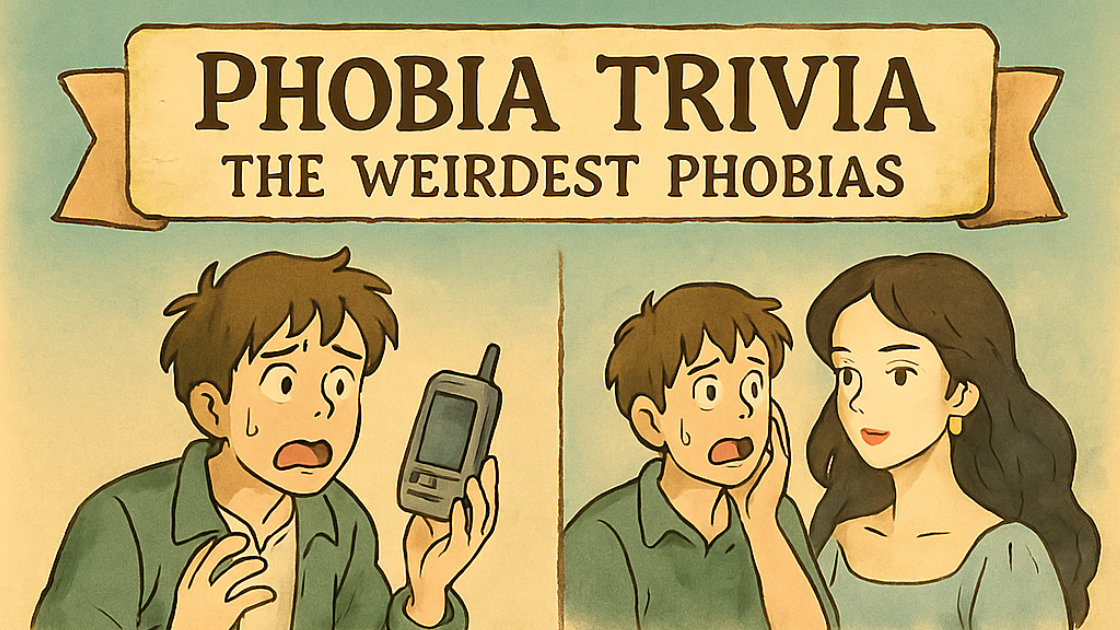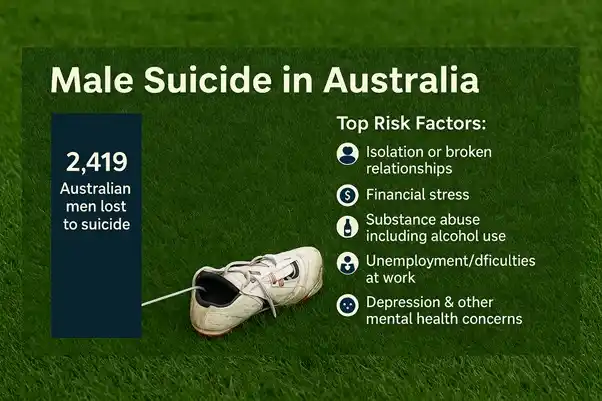Tips on How to Stop Eating Junk Food
In today’s world, time efficiency and the desire for immediate satisfaction have become primary considerations for individuals. Junk food can provide this satisfaction because it not only tastes good, but it is convenient and easily accessible.
Consequently, many people unconsciously engage in the consumption of unhealthy food in copious amounts. Consuming excess junk food can create a vicious cycle wherein the more one eats, the stronger and more consistent the cravings become. Although individuals possess cognitive knowledge regarding the detrimental effects of consuming unhealthy food, research suggests that certain neural processes in the brain may contradict this understanding.
While some people can easily limit the amount of junk food they eat, others cannot. This is not due to a lack of determination. It’s slightly more complicated than that. Junk food activates the brain’s reward system the same way as addictive substances like narcotics or cocaine, does. For some, consuming junk food can progress into a full-fledged addiction with a similar biological foundation as drug addiction.
What makes junk food so addictive?
Let’s look at how food addiction works.
The brain has an in-built reward system that evolved for primitive survival reasons. It rewards and encourages actions that allow us to live, such as eating.
When a person eats delicious, energy-dense food, the brain recognizes this as something good. Something that enhances survival. In response, the brain’s reward mechanism will release feel-good hormones, such as dopamine – a hormone that allows you to feel pleasure.
The brain will continually seek out acts that cause the reward system to produce dopamine.
However, the issue with modern junk food is that it may provide a heightened sense of pleasure in a far more potent than any reward the brain can obtain from nutritious meals.
Whilst eating an apple or a piece of steak may induce a mild release of dopamine, eating ice cream causes a significantly larger release.
As previously mentioned, the human brain has a natural inclination towards seeking out experiences and activities that stimulate the release of dopamine, a neurotransmitter that elicits pleasure and happiness. As a result, the brain adapts the more we consume rewarding foods – making more receptors for dopamine and triggering more consistent cravings.
But there’s more to it.
Eating is a powerful process. When we eat, we are, in reality, connecting nutrition with our thoughts and emotions. Sometimes, we eat to strengthen our social connections.
Emotions and sentiments are therefore, powerful triggers for food selection.
We form subconscious connections between our food and emotions from a young age. Food often serves as a means of emotional regulation in response to various feelings and circumstances, such as sadness, happiness, celebrations, commemorations, loneliness, anger, and more. This association with food often occurs well before individuals have complete autonomy over their dietary choices, as they are influenced by their parents’ decisions regarding their nutrition.
Primarily, we engage in actions to either seek pleasure or avoid suffering. Eating is no exception.
On the most fundamental level, humans might feel “pain” in the form of hunger and seek pleasure through nutrition (food and drink).
Now, consider what happens when emotions enter the picture.
Humans are wired to avoid discomfort, and as we discover foods and drinks that offer pleasure, we begin to utilize these substances for reasons other than hunger.
When it comes to eating, individuals frequently find themselves in pleasure trap, especially when it comes to foods that activate the reward centres in the brain.
So, how can you stop eating junk food?
The first step is to ask yourself if you are an emotional eater.
Bodily and emotional hunger can sometimes be confused (although there are important distinctions between the two). Examine how and when you become hungry and how you feel after eating.
Ask yourself the following questions:
- Do you eat more when you are stressed?
- Do you find yourself eating even when you’re not hungry or full?
- Do you eat to make yourself feel better?
- Do you routinely give yourself food as a reward?
- Do you feel protected when you eat?
- Do you ever feel a lack of control when it comes to food?
Physical Hunger vs Emotional Hunger
Understanding your hunger signals – does your body really need food?
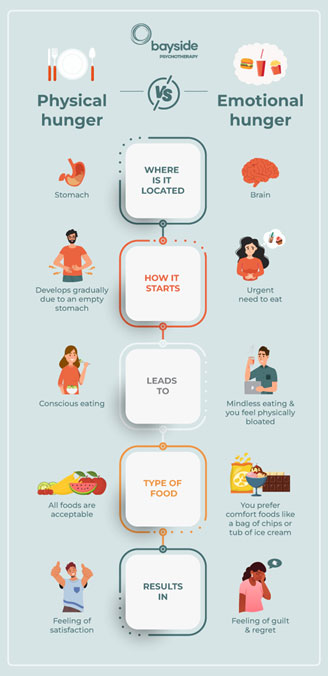
Emotional hunger hits you hard and fast, and it seems overpowering and urgent. A yearning for food types, such as sweet snacks, lollies, chocolate, pizza, fries, and so on, is more often due to emotional hunger.
Physical hunger develops more gradually. The need to eat may feel less urgent or require immediate gratification (unless you have not eaten anything in a very long time). When physically hungry, practically everything, including nutritious foods, seems appealing.
Emotional hunger frequently leads to mindless eating. For example, it is easier to consume a bag of chips or a tub of ice cream without realising it when feeling emotionally hungry. Hypnotherapy can be excellent to address emotional eating.
On the other hand, when you eat to satisfy physical hunger, you are usually more conscious of what you are doing and how much you may be eating. While physical hunger can lead to feelings of satiation, you may not feel satisfied when feeding emotional hunger.
This is because emotional hunger is not a physical sensation originating from your stomach. Instead, it is a craving that persists in your thoughts – unlike the rumbling or discomfort that stems from an empty stomach.
And it frequently leads to guilt, low mood or humiliation.
You are unlikely to feel guilty or humiliated if you eat to fulfil physical hunger since you are simply providing your body with the fuel it needs. If you feel guilty after eating, it could be because you choose foods that lack the needed nutrition.
What can trigger emotional eating?
Emotional eating can occur when food is used to dampen intense emotions. These emotions may stem from a psychological response to stress.
Other psychological risk factors could stem from:
Low self-worth: Several studies have identified a link between compulsive eating and one’s self-esteem. Having low self-worth can cause one to indulge in compulsive behaviours – including binge-eating junk foods.
Dopamine reward system: As discussed above, your body may have developed a heightened response to seek out dopamine. In this case, abstinence may be the best way to break the habit.
Dealing with cravings – Tips
Eating regularly and avoiding skipping meals is critical to dealing with cravings. It is also important to consume snacks if hungry and to have good sleep hygiene. Gaining a better understanding of the nutritional worth of food can also help.
Here are some additional common sense tips that can help you manage cravings better:
- Prepare ahead of time
Planning your meals and snacks is a great way to deal with cravings. If you have a nutritious meal and snacks on hand for when you need it, you may be less inclined to reach for unhealthy and convenient food choices, such as leftover pizza, french fries, or sweets at the workplace.
Apples, bananas, and oranges travel well and can be conveniently stored at your desk to be consumed as snacks.
- Shop for fresh, whole foods at the supermarket
Purchase more from the outer aisles of the supermarket, where fresh, perishable food is often located. Focus on whole foods such as vegetables, dairy, meat, and seafood sections. Planning your meals and writing a list can go a long way in aiding good food-purchasing decisions.
By following this simple rule, you can fuel your body with the nutrients it needs, which can help curb cravings for unhealthy processed foods. Remember, investing in wholesome meals is an investment in your long-term health and well-being.
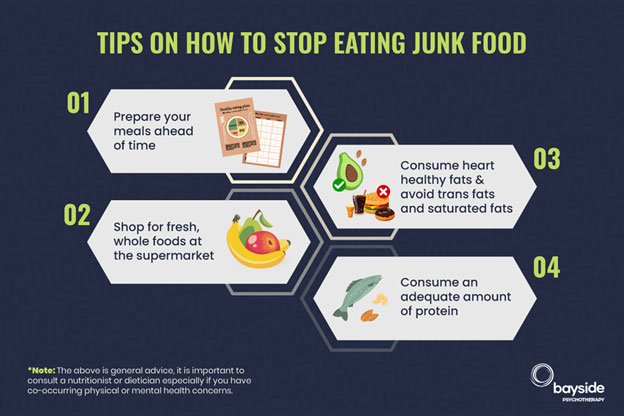
- Consume healthy fats*
One of the most prevalent dietary fallacies is that fat causes weight gain.
But our body needs fat.
What you need to know, however, is that there are several forms of fat. Try to avoid trans fats and saturated fats and consume heart-healthy fats instead – like the fats in almonds and avocados. Unsaturated fats like these will help you feel full and minimize cravings.
Make a salad dressing with olive oil and vinegar. Making fresh guacamole or consuming fatty seafood like salmon is another fantastic way to fuel your body with the nutrients it needs.
- Consume an adequate amount of protein
It is common knowledge that protein helps to keep you full. This is partly because protein helps to reduce your level of the hunger hormone – ghrelin. Protein-rich snacks like yogurt, hard-boiled eggs and peanut butter are an excellent way to curb hunger.
Please note the above is general advice, it is important to consult a nutritionist or dietician especially if you have co-occurring physical or mental health concerns.
If you or someone you know wants to better their relationship with food and make a positive change, reach out for professional help.
Visit us at https://www.baysidepsychotherapy.com.au/ and help us help you.
Here are a couple of blogs written on this topic you might find useful:
What Are Australians Most Afraid Of? N...
From snakes and spiders to needles and ghosts, fear takes many forms. But what do Australians fear most in 2025? To find out, we turned to one of the.
Is It Time For The AFL To Cast A Menta...
At Bayside Psychotherapy we are passionate about mental health and like many fellow Melbournians, many on our team are avid AFL fans. So when two of our.
Exploring Emerging Therapies: Understa...
At Mind Medicine Australia, we are dedicated to transforming the trea.
The Balance of Power in Romantic Relat...
Why do some relationships thrive while others feel like a constant tug-of-war? Power dynamics lie at the heart of this balance.


